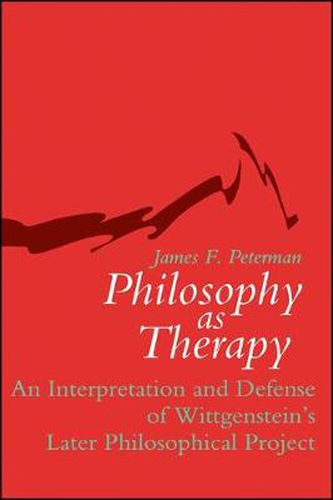Readings Newsletter
Become a Readings Member to make your shopping experience even easier.
Sign in or sign up for free!
You’re not far away from qualifying for FREE standard shipping within Australia
You’ve qualified for FREE standard shipping within Australia
The cart is loading…






This book presents an account and defense of Wittgenstein’s later philosophy emphasizing its therapeutic character. Peterman argues that any therapeutic philosophy must present an account of human health, a related account of the mechanisms of health and illness, and finally an account of how philosophy can bring someone from a state of illness to health. In light of this general model, he presents an interpretation of Wittgenstein’s therapeutic project that emphasizes the continuity between it and the earlier ethical project of the Tractatus. The book confronts the problem of continuity by arguing that the earlier ethical goal of coming into agreement with the world as such is replaced in the later views by the therapeutic goal of coming into agreement with forms of life. In the course of the argument, Peterman challenges standard interpretations of Wittgenstein’s project and standard modes of criticizing and defending it. The book also contributes to contemporary philosophical discussion by showing why we should take seriously the project of philosophical therapy.
$9.00 standard shipping within Australia
FREE standard shipping within Australia for orders over $100.00
Express & International shipping calculated at checkout
This book presents an account and defense of Wittgenstein’s later philosophy emphasizing its therapeutic character. Peterman argues that any therapeutic philosophy must present an account of human health, a related account of the mechanisms of health and illness, and finally an account of how philosophy can bring someone from a state of illness to health. In light of this general model, he presents an interpretation of Wittgenstein’s therapeutic project that emphasizes the continuity between it and the earlier ethical project of the Tractatus. The book confronts the problem of continuity by arguing that the earlier ethical goal of coming into agreement with the world as such is replaced in the later views by the therapeutic goal of coming into agreement with forms of life. In the course of the argument, Peterman challenges standard interpretations of Wittgenstein’s project and standard modes of criticizing and defending it. The book also contributes to contemporary philosophical discussion by showing why we should take seriously the project of philosophical therapy.